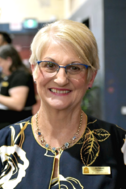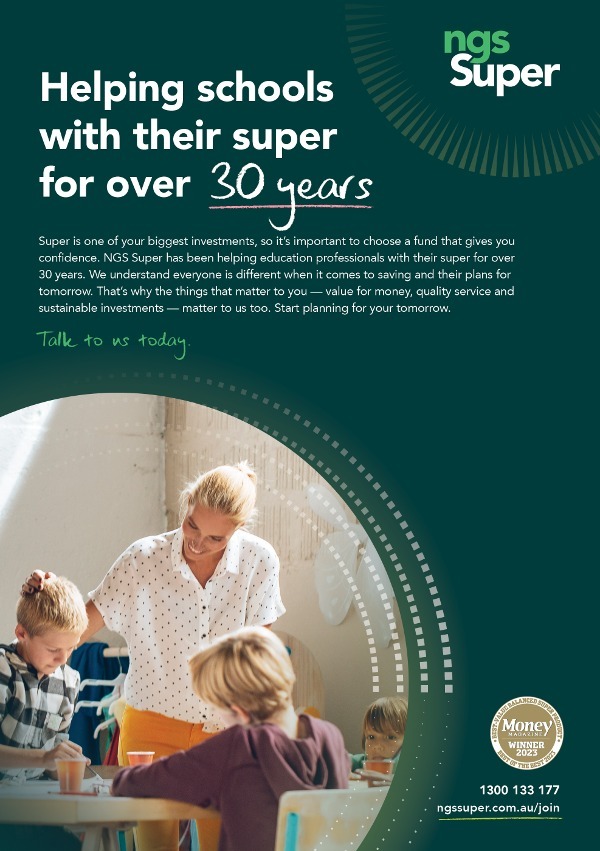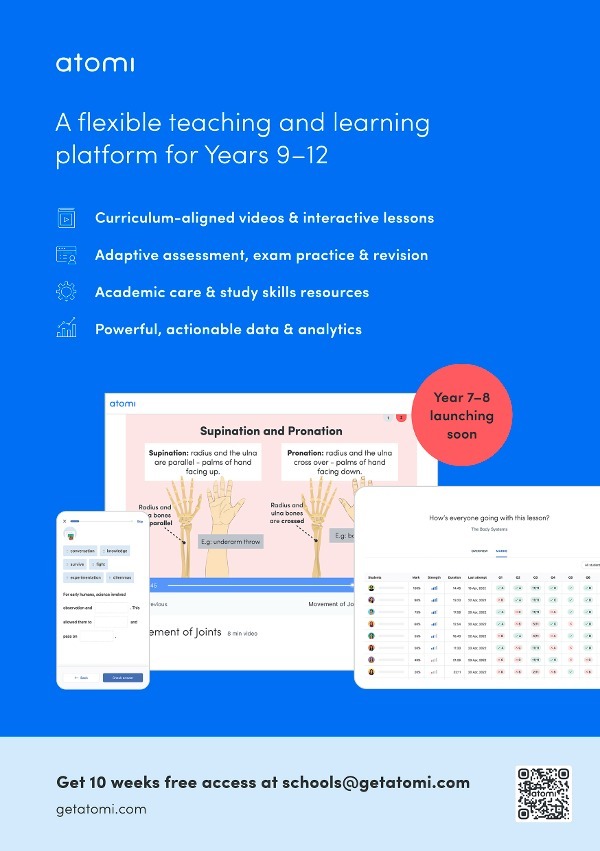July 2023 Newsletter
-
President's Message
-
CaSPA Board Update
-
The School Photographer - Platinum Partner
-
CaSPA Latest News
-
PSW - Platinum Partner
-
Principal Profiles
-
Box Of Books - Platinum Partner
-
CaSPA National Conference 2024 – SAVE THE DATE!
-
Early Literacy Education
-
NGS Super - Platinum Partner
-
Developments in higher education admission practices - June 2023
-
AGH Camps - Gold Partner
-
Attacks on Principals Rising
-
Rory's - Gold Partner
-
Woods Furniture - Gold Partner
-
ACPConnect
-
Atomi - Gold Partner
-
INSTALLING THE SZAPP
Dear Colleagues
I hope Term 2 has gone well for you and your community. We are very pleased and excited to announce that CaSPA has received a commissioned art piece from Dr Miriam Rose Ungunmerr Baumann from Nauiyu country, who lives in Daly Waters in the Northern Territory. Miriam Rose was a Catholic School Principal in the Northern Territory, a leader in many areas, as Senior Australian of the Year 2021, and a renowned artist.
It is a beautiful painting and symbolic of CaSPA’s work around Australia. It is my hope that we can officially launch the painting in our next newsletter for all to see and to read the narrative that explains the symbolism.
The CaSPA Board looks forward to the full implementation of the Uluru Statement of the Heart. Reconciliation in Australia of First Nations People and non-First Nations People is an important social justice matter. The recent passing of the Referendum Bill to allow the vote regarding the Voice to Parliament for First Nations People will hopefully be a positive step forward for reconciliation.
A big thank you to the Catholic Principals Associations who will be sending their president and Executive Officer to the CaSPA Combined Meeting in Melbourne on 24 July. This annual gathering of our 8 associations is a great way to hear issue updates and discuss contemporary education issues. This year we are truly blessed by having key presenters to our Combined Meeting. NCEC, AITSL, ACU and AERO will all be providing updates and seeking feedback from the meeting participants.
Following the Combined Meeting, representatives from the CaSPA Board will be meeting with our 8 Partners in Melbourne on 25 July. This Partners Meeting has also become an annual event to show our appreciation of the wonderful support the businesses give CaSPA to enable our Awards, Professional Learning and Social Action activities. Please remember our Partners if you need quotes from their line of business.
CaSPA has continued to be an advocate for Catholic Education during this consultative time regarding the National School Reform Agreement, which is due for 2024. In recent times there has been evidence of an emerging lobby group advocating to stop funding to non-government schools. CaSPA has been meeting with ACPPA, CSPA and NCEC to ensure our voices are heard in this debate. It is imperative that all schools are financed in line with bridging the equity gap. Catholic Education provides a great bridge and targeted education to many, which would not be possible if funding was cut.
Blessings to All
Ann Rebgetz
CaSPA President

- Board Meeting held in Sydney – met with ACU Research Team regarding the 2023 Principal Survey, David deCarvalho (ACARA) and Jacinta Collins (NCEC).
- CaSPA Zoom Meeting held on 20 June which included a consultation with Sarah Richardson from AERO.
- Next CaSPA Board Meeting to be held in Darwin 16 – 17 August. The CaSPA Board looks forward to meeting with NTCSPA and visiting the Bathurst Island schools.
- CaSPA finalising being a funding partner for 3 years with Queensland University of Technology to research inclusivity issues in Australian Schools.
- CaSPA Board has finalised an agreement with ACU to conduct research and provide recommendations regarding the development of aspiring leaders.
- CaSPA preparing a research funding application with the Principals Australia Research Foundation (PARF). Research is planned for 2024.
- Board Meeting with Higher Education Division of the Australian Government Department of Education to discuss admission practices.
- Combined meeting with the 8 State and Territory Associations to be held in Melbourne on 24 July. AITSL, AERO & NCEC will be presenting at the meeting.
Profiles of all the CaSPA Board are available on the CaSPA Website: https://caspa.schoolzineplus.com/current-and-past-board-members
- CaSPA has met with ACPPA, CSPA and NCEC as a part of the Catholic Education Stakeholders Forum (CESF) on 27 June.
- Meeting with Coalition of Australian Principals (CAP) on 20 June to finalise the Broadcast video with Michael Carr-Gregg related to the intensity of work for Principals in Australia.
- CaSPA Representatives attended the ACSP (NSW) conference in Wollongong.
- Australian Catholic University 2022 Principal Well-being Report and plans for 2023 was distributed to the State and Territory Secondary Principals Associations.
- Guest speakers finalised for the Combined Meeting in Melbourne 24 July – Jacinta Collins (NCEC), Mark Grant & Daniel Pinchas (AITSL), Sarah Richardson (AERO) and Meg Brighton (Dept of Education).
- Meeting and Dinner has been organised at Sofitel Hotel for the 7 CaSPA Partners on 25 July in Melbourne.
- Liaising with SchoolZine and Athas Concepts to make amendments to the CaSPA Website
- Data Project for 2023 has been completed and infographics to be released at the Combined Meeting in July.
- CaSPA welcomed the new Presidents of APPA, AHISA and ASPA.
- New CaSPA Partner joined in June – AGH Camps (Gold Partner)
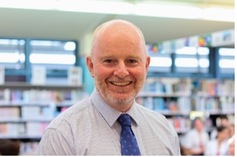
Name: Kevin Lewis
Current School: Xavier Catholic College, Ballina NSW
Previous Position: Principal - St Paul’s Catholic College, Kempsey NSW
First year as Principal: 2013
My big picture for my current school is: We have recently undergone a School Improvement process and have identified areas that need a renewed focus. One of these is a relatively untapped area of parent partnership. Developing and refining a strong parent partnership can be pivotal in ensuring you have all stakeholders onboard for growth and development of your community.
The Joy of Principalship is: Setting in place a vision for success, providing the right resources and support for it to progress, selling that vision to your teams and then letting them loose as professionals to make it come to life. Most often the end result is evidenced in the great outcomes for your students, whether they be academic, pastoral/relational, employment or social outcomes.
Favourite book: The Lord of the Rings/The Hobbit and Nine Lies About Work
Favourite food: Anything Thai, roast lamb and vegetables, steak on the BBQ.
Interests/hobbies: Playing hockey (badly) and beach/headland running which mostly involves a lot of walking. Going to festivals (the more sedate daytime variety). Camping and spending time with friends and family
My favourite wellbeing strategy: I ensure that most, if not all of my work is done before I leave the office. It is important that when I get home that I can switch off from work and be present. A good glass of red helps too.
Advice for a beginning Principal: Don’t be lured into thinking that just because you have been successful in getting a senior leadership role, that you are now required to be all things to all people. Your wellbeing is crucial and you need to make sure you have strategies in place from the get-go, otherwise those spaces where you had opportunity to attend to your needs will be quickly filled with other people’s agendas and items. You will then find that you suddenly have no time to look after yourself.
I would also strongly advise that you have a big focus on setting up high performing teams. You are the big picture thinker, but it will not come to fruition without teams that work effectively together and who use ‘team technology’ to get things done. Being the best, most well-rounded person in the school is not possible, and in fact it is dangerous to think you have to be. You need well-rounded teams, not well-rounded individuals. Well-rounded people who can do everything don’t exist in reality. You need to ensure you surround yourself with people who have strengths that complement yours, not replicate them.
Do not try to define your leadership by a set of qualities you may or may not possess. Your leadership is defined by the fact that you have a team of people who want to follow you or something about you. Find out what that thing is, nurture it and grow it as a real strength. Sure you can identify flaws or areas that need improvement, don’t ignore them as a goal to improve, but make sure you prioritise first your strengths as areas for growth. Growth does not come from fixing flaws or deficiencies, but from excelling in areas where we have the most talent.
Favourite leadership quote: “You cannot learn very much about excellence from studying failure.” ― Marcus Buckingham
What title would you give to your TED Talk or Book?: Nobody told me I had to do that…!!
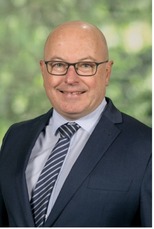
Name: Wayne Chapman
Current School: Clairvaux MacKillop College, Upper Mt Gravatt
Previous Position: Principal, Mt Maria College, Petrie
First Year as a Principal: 2019
My big picture for my current school is: Clairvaux MacKillop College is a wonderful community. It is a huge and busy place. I hope to enhance the college processes to find efficiencies for our staff members who do amazing work.
The Joy of Principalship is: Seeing students and staff develop and grow.
Favourite Book: All the Light we Cannot See by Anthony Doerr
Favourite Food: Anything spicey
Interests / Hobbies: I love to attend live music. A great day is one spent fishing!
My Favourite Well-Being Strategy: Spending quality time with family and friends as often as I can. regular exercise.
Advice for a Beginning Principal: Trust the people around you to do their job and let them do it.
Favourite Leadership Quote: The fundamental pillars of school leadership are relationships; nothing substitutes for building and nurturing them (Joanne Rooney)
What Title would you give to your TED Talk or Book: Go gently.
There’s a common narrative that it’s essentially 'game over' for students who enter secondary school without foundational literacy and numeracy skills – but new research has shown it’s not too late to change their trajectory.
Released today, a report from Australian Education Research Organisation (AERO) proposes a ‘promising’ model secondary schools can adopt in order to best support students struggling in these critical domains.
AERO program director and former teacher Daniel Carr told EducationHQ a ‘multi-tiered system of supports’ (MTSS) framework offered an evidence-backed solution.
“Our research does show that it's not too late for these students," Carr said.
“If you use the right instructional practices, you can still get improvements in their reading, writing and mathematics.
“And so, it isn't the case that there's nothing that can be done, there are things that can be done, and our resources give schools an orientation and start developing their understanding of what the approach that will serve success looks like,” Carr said.
One in five Australian students enter high school three or more years behind their peers in literacy or numeracy achievement, the report flagged.
And while just over half of teachers and school leaders believe their schools are able to consistently provide support for these children, more than two in five are not confident the intervention they offer is even effective, an AERO survey showed.
Support was also found to vary significantly between schools.
While some offer targeted supports and have clear strategies in place, others make ‘ad hoc’ decisions that are based on student preference, teacher availability and personal expertise, the survey found.
Carr said the results clearly indicate that secondary schools need more guidance in this area.
“What that shows to us, is that there's still some uncertainties about what support looks like when it's effective – that secondary schools have question marks about how to do it effectively, what it looks like, how to target and identify which students need support, and then what support programs to put in place.”
It’s a widespread problem across the country, Carr indicated.
“I think part of the challenge [is] secondary school teachers [are] not trained to address some of these gaps, because it’s assumed some of these skills in reading, writing and mathematics have been mastered or comprehensively understood by the time students enter secondary school…”
This is where the MTSS approach steps in, he noted.
Described as a ‘decision making tool’ to guide intervention and instructional practices, an MTSS model stresses:
- Using teaching practices for all students that have been proven to work, such as explicit instruction.
- Regular testing of all students to identify specific gaps in learning.
- Interventions (delivered in small group teaching or 1:1 tuition formats) that are proven to be effective and that address specific learning gaps.
- Continuous review of student progress through assessment data to ensure interventions deliver actual gains.
“It's high-quality instruction for students; regular screening of students to identify who has gaps and what they look like if they are there; bringing into place interventions to fix those and to target those gaps; and then monitoring those interventions and tweaking them if they're not showing the desired level of progress,” Carr elaborated.
AERO’s research, conducted with Monash University, found that explicit instruction was “one of the most beneficial” instructional practices that teachers can use to support secondary students with low levels of literacy or numeracy, Carr added.
MTSS is an evolution of the RTI model – currently used in some Australian primary schools – that also draws in behaviour and engagement support.
International findings paint an encouraging picture of its impact, the expert said.
“When it's been used in internationally for primary schools, it’s led to more students basically beating expected literacy (and) numeracy outcomes.
“And more importantly, it also means that there are fewer ... students who are being referred into a special school or special school programs.
“So, it's actually been shown that this approach is useful for accommodating a wide variety of students within a mainstream school setting as well,” Carr said.
AERO CEO Dr Jenny Donovan said the research offered an “exciting opportunity” for schools to look into implementing MTSS.
“MTSS offers a way forward for schools and education systems to reduce the number of struggling students who leave schools without the literacy and numeracy skills required to fully participate in society,” she noted.
Carr said the potential consequences for these students were well documented.
“We know that when kids come into secondary schools with a level of literacy or numeracy below these minimum standards, it's difficult for them to engage fully in the secondary curriculum.
“That means there are likely impacts on their levels of engagement in class, ultimately, that can manifest in lower attendance throughout secondary school, lower chances of completing secondary school, and then it has implications in terms of their job and further education opportunities after school.”
The project is ongoing, with AERO set to release more specific recommendations and guidance to schools later this year.
“What we're hoping to get to by the end of this year is a really comprehensive package of resources and guidance…” Carr said.
“There is some more work to be done, but we're really excited to be getting this initial set of research and guidance out today.”

